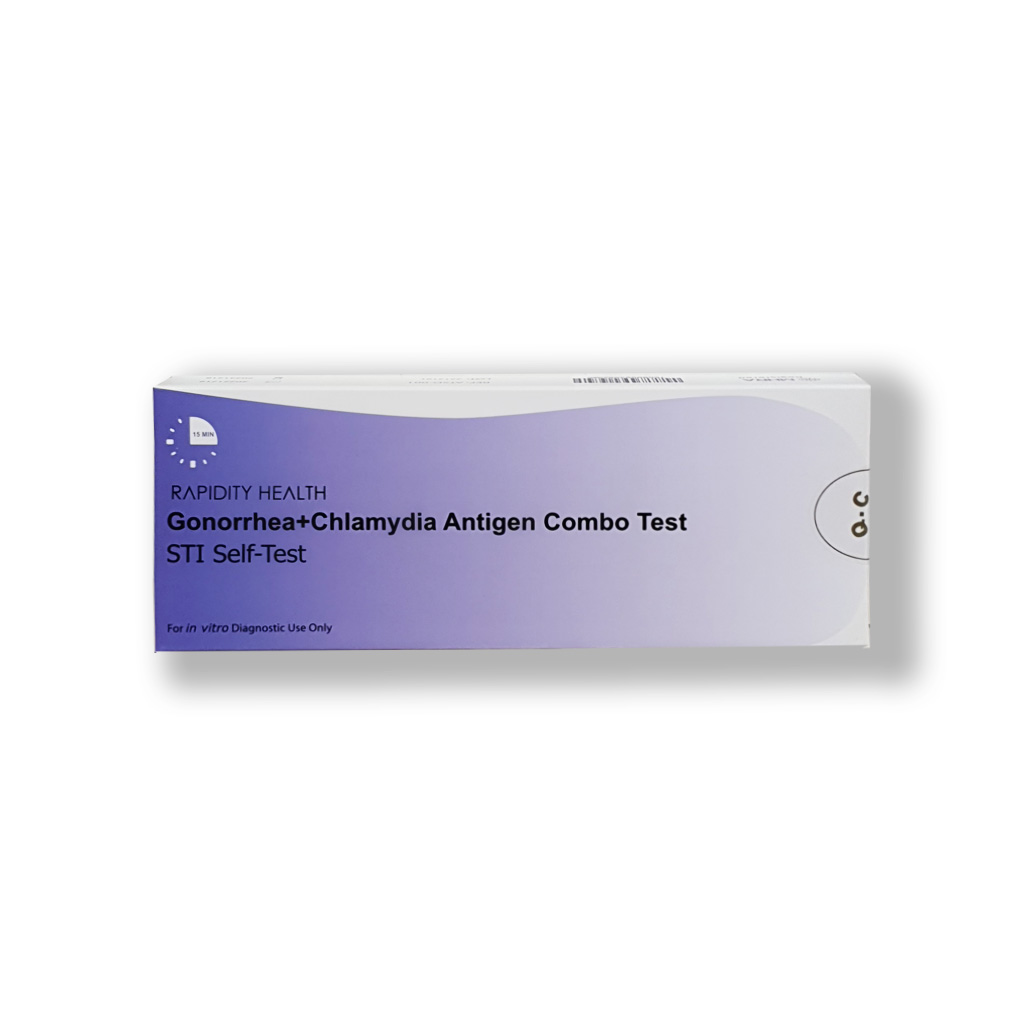Description
Frequently Asked Questions
What is the Gonorrhoea & Chlamydia Combo test?
The Gonorrhoea & Chlamydia Combo antigen test detects material from the bacteria Neisseria Gonorrhoea/Gonococcus and Chlamydia Trachomatis, using antibodies attached to the lateral flow device.
This test can be performed on a urine sample or a swab sample taken from the site of potential infection.
What is Gonorrhoea?
Gonorrhoea is an infection caused by a sexually transmitted bacterium called Neisseria gonorrhoeae or Gonococcus.
It is usually associated with uncomplicated infections (can be cured by adequate single injection treatment while complicated disease cannot ) of the lower genital tract, which symptomatic in most men and approximately half of women. Infection can also occur on other sites on the body like the rectum or pharynx and these are usually asymptomatic.
Why should I test?
Undetected or inadequately treated, gonorrhoea can cause many complications, such as:
- Epididymo-orchitis in men
- Pelvic inflammatory disease, which may result in tubal infertility and ectopic pregnancy, in women
- Infections that can spread to the joints and other areas of the body
- Increased risk of contracting HIV and AIDS
- Complications in babies.
Being tested regularly can allow early diagnosis and treatments to prevent these serious complications before permanent damage is inflicted.
If you are pregnant and at risk of contracting gonorrhoea, it is important to get tested. Untreated gonorrhoea has been linked to the following:
- Miscarriages
- Premature birth and low birth weight
- Premature rupture of membranes
- Chorioamnionitis
Infants can develop eye infections during child birth as they pass through the birth canal.
What are the symptoms of Gonorrhoea in women?
Symptoms of gonorrhoea include some of the following:
- Painful urination,
- Increased vaginal charge,
- Vaginal bleeding between periods and/or after intercourse,
- Abdominal or pelvic pain.
What are the symptoms of Gonorrhoea in men?
- Symptoms of gonorrhoea include some of the following:
- Burning sensation when peeing
- A white, yellow, or green discharge from the penis
- Painful or swollen testicles
- General symptoms
Gonorrhoea can affect other parts of the body. Symptoms include some of the following:
- Anal discharge or itching,
- Anal soreness and bleeding,
- Painful bowl movement,
- Sore throat,
- Swollen lymph nodes in the neck.
How is Gonorrhoea spread?
Gonorrhoea can spread through any sexual activity, this includes vaginal, anal and, or oral sex with someone. This infection can also be passed from mother to infant during childbirth.
When should I get tested?
Anyone with symptoms of gonorrhoea should be tested. However, because many people who are infected with gonorrhoea do not have any noticeable symptoms it is important to get regularly tested if you are sexually active, and/or a pregnant woman who is at high-risk of contracting gonorrhoea as gonorrhoea can be passed from mother to child during childbirth.
What does a positive test mean?
A positive test indicates that you have an active gonorrhoea infection that requires treatment.
What does a negative test mean?
A negative test indicates that you have not got an active gonorrhoea infection that requires treatment.
How accurate is the test?
The test has a Sensitivity=90.00% and a Specificity= 95.00%
What is Chlamydia?
Chlamydia is a common curable STI caused by the bacteria chlamydia trachomatis and can afflict the cervix in women and the urethra and rectum in both men and women. Other parts of the body can also be affected such as:
- Lining of the eyelid
- Throat
- Rectum
There are often no symptoms in the early stages of chlamydia.
Why should I test?
Chlamydia is often referred to as the “silent infection”. This is because most people with chlamydia show zero symptoms. When left untreated it can cause serious health problems like infertility. Symptoms may not appear until several weeks after having sexual intercourse with a partner who has chlamydia. Being tested early results in early treatment and care before the infection can cause irreversible damage to your body and health. If you are pregnant and at risk of contracting Chlamydia it it important to get tested. Untreated Chlamydia has been linked to the following:
- Preterm labour
- Premature rupture of membranes
- Low birth weight
Infants can develop eye and lung infections during child birth as they pass through the birth canal.
What are the symptoms of chlamydia in women?
The most common symptoms include:
- Pain when urinating
- Unusual vaginal discharge
- Abdominal or pelvic pain
- Pain during sex
- Bleeding in-between periods or after intercourse
If left untreated chlamydia can spread to the womb and cause PID (Pelvic inflammatory disease). Some complications of PID are formation of scar tissue that can block the fallopian tube and can cause an ectopic pregnancy or infertility.
What are the symptoms of chlamydia in men?
The most common symptoms include:
- Pain when urinating
- White, cloudy or watery discharge from the tip of the penis
- Burning or itching in the urethra
- Pain in the testicles
If left untreated chlamydia can cause swelling in the testicles and epididymis (tube that carries sperm from the testicles), this can cause infertility.
General Symptoms
- Chlamydia can affect different areas of the body, this includes:
- Rectum- discomfort or unusual discharge
- Throat- sore throat, white spots at the back of the throat or swollen neck glands
- Eyes- symptoms can be redness in the eye, pain and discharge
How is chlamydia spread?
Chlamydia can spread through any sexual activity, this includes vaginal, anal and, or oral sex with someone. This infection can also be passed from mother to infant during childbirth.
What does a positive test mean?
A positive test would mean that we have detected the bacterium that causes the Chlamydia.
What does a negative test mean?
A negative test would mean that we have not detected the bacterium that causes the Chlamydia.
How accurate is the test?
The test has a Sensitivity= 93.00% and a Specificity= 97.50%


Reviews
There are no reviews yet.